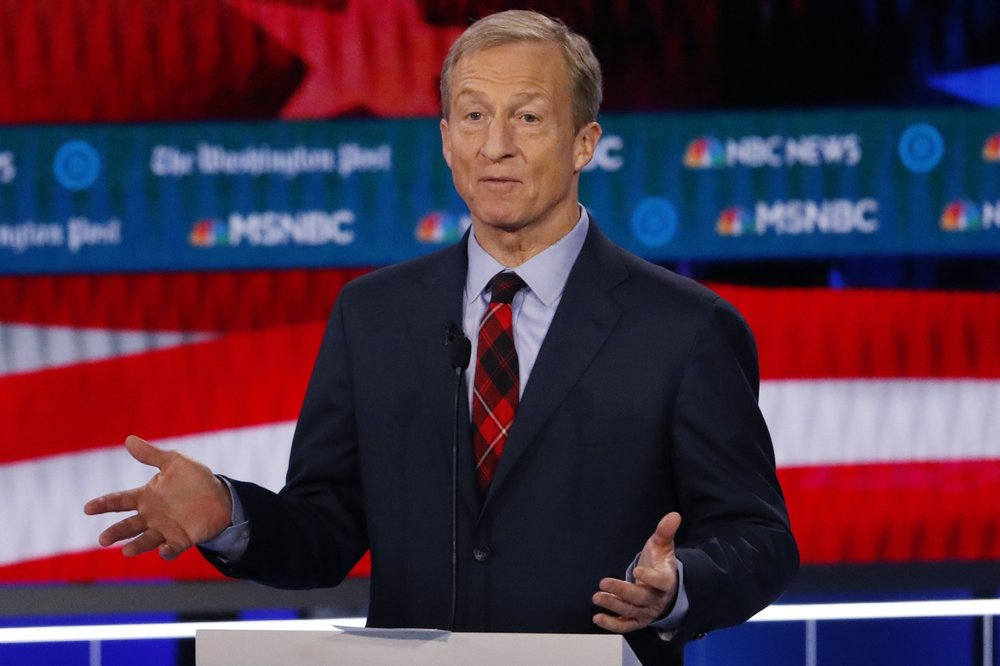Democrats are narrowing President Donald Trump’s early spending advantage, with two billionaire White House hopefuls joining established party groups to target the president in key battleground states that are likely to determine the outcome of next year’s election.
Priorities USA and American Bridge, two of the leading Democratic outside groups, are ramping up operations. The organization ACRONYM recently pledged to spend $75 million. And former New York Mayor Michael Bloomberg has pledged to spend $100 million on ads targeting Trump, while California billionaire Tom Steyer promised $50 million.
The billionaires have come under fire from some Democratic rivals for trying to buy the presidency. But the influx of cash is soothing anxiety in some corners of the party that Trump, who has repeatedly broken fundraising records, was off to an unprecedented early start in the 2020 advertising wars. Some had argued that the Democrats’ overwhelming focus on the sprawling presidential primary field allowed the president to burnish a reelection narrative unchallenged ahead of what is expected to be an exceptionally close election.
“It’s safe to say the gap is closing,” said David Brock, who leads several Democratic groups, including American Bridge. “People can breathe a little bit of a sigh of relief that there is a major Democratic response now and that Trump’s spending will be met.”
The money has put Democrats on firmer footing in states such as Florida, Wisconsin, Michigan, Pennsylvania, North Carolina and Arizona, which will be key to victory in 2020. But it’s unclear how long it will last.
Trump has built a massive money-raising machine that has fused a traditional network of big-dollar Republican donors with a sophisticated digital operation that has raked in small contributions from rank-and-file supporters.
Sitting presidents have long used their office to draw a spotlight and rake in money while the party out of power fights its way through a primary. Trump, however, never really ceased campaigning and has been running for reelection essentially since taking office, giving him a far earlier head start.
For months, his campaign has spent comparatively little on digital advertising in battlegrounds, while dumping money in population-dense states like New York, California and Texas, which are rich in potential donors but won’t decide the outcome of the election. Yet the money he is raising there will enable him to flood important states with advertising early next year.
Over the summer, the lack of spending fueled worries — and some snipping — that not enough was being done counter Trump.
“We welcome other efforts. But we also need to remember that Trump has yet to start spending money big in swing states,” said Patrick McHugh, the executive director of Priorities USA, which spent roughly $200 million during the 2016 election. “Matching dollar for dollar now would come at the detriment of matching his spending online and on television once he begins spending in earnest in states that matter.”
While the economy overall has performed well during Trump’s presidency, Priorities is driving a message that aims to move beyond the toplines and connect peoples’ frustration with their own financial well-being directly to the president. The group has yet to say how much it will spend on the 2020 contest, but it has outspent Trump $6.5 million to $2.2 million since July on Facebook and Google in Florida, Wisconsin, Pennsylvania and Michigan.
American Bridge, which has traditionally focused on conducting opposition research, has launched a $50 million radio, TV and digital advertising campaign in the same states that is geared toward rural and exurban voters in about 80 counties that Barack Obama carried but later switched to Trump.
“It’s a margins game that we’re playing, but we think that we can get enough people to defect,” Brock said.
The group ACRONYM will spend $75 million between now and Election Day on online advertising highlighting the “broken promises” and perceived corruption of the Trump administration. Recent ads have attacked Trump for failing to deliver on his pledge to bring manufacturing jobs back to the U.S. by highlighting the decision by General Motors to close its Lordstown, Ohio, plant.
Organizations financed by Steyer, meanwhile, are working to register young people to vote. That includes a door-knocking campaign, as well as digital advertising by NextGen America, where he was president until stepping down over the summer to launch his campaign.
An early salvo of ads run by Bloomberg accuses Trump of not caring about health care and questions his temperament and social media use. One recent Facebook ad captioned “What did he tweet today?” features an image of a man facepalming his forehead.
“The president is out making his case. And we’ve got to make sure that he doesn’t make it unrebutted,” said Bloomberg chief adviser Howard Wolfson.
Since Trump took office, many Democrats have celebrated an outpouring of small-dollar online contributions from an energized grassroots base. Some progressives have touted this success as a viable alternative to the party’s historic reliance on wealthy donors, whom they criticize for having outsized influence.
But the reality is both streams of money will be needed against Trump. Particularly before the nominee is chosen, outside groups and the Democratic National Committee — they depend on major donors to finance their efforts — will be handling the lion’s share of general-election work.
During a recent DNC fundraiser headlined by Obama, tech CEO and philanthropist Amy Rao fired up a well-heeled crowd of about 100 who gathered at the home of megadonor Karla Jurvetson, high in the hills overlooking Silicon Valley.
Defeating Trump, she said, was so important that they should be digging in to their “retirement and what you thought you were going to leave to your children” to support the party regardless of who becomes the nominee. She encouraged the crowd to give “so much that it actually hurts.”
“It’s only money. You’ll never miss it,” Rao said. “The biggest gift you can give to the generations that follow us is to make sure this president loses in 2020.”
(AP)











